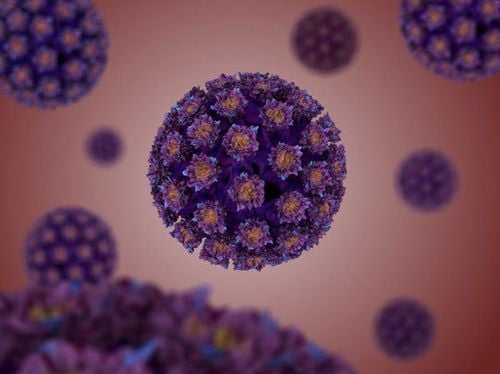This is an automatically translated article.
Cervical cancer is a common gynecological disease in women and appears more and more, especially in developing countries. In most cases, cancer is a non-communicable disease. However, cervical cancer alone can be transmitted by the HPV virus.
1. What is cervical cancer?
Cervical cancer is a type of cancer that occurs in the cells of the cervix - the lower part of the uterus that connects to the vagina. It mainly affects sexually active women between the ages of 30 and 45. Cervical cancer is caused by a virus called HPV. The virus is spread through sexual contact. Most women's bodies can fight off an HPV infection. But sometimes viruses lead to cancer. You are at higher risk if you smoke, have had many children, use birth control pills for a long time, or have HIV.

Virus HPV gây ra ung thư cổ tử cung
2. What are the symptoms of cervical cancer?
Some typical symptoms to detect cervical cancer:
Abnormal vaginal bleeding, usually occurs between menstrual periods or after sex, after menopause. Abnormal vaginal discharge, little white blood at first, then gradually increase, may be thin or mucoid, cloudy or bloody like fish blood, long-term bad smell. Pain after sex; Pelvic pain, or a dull ache, occurs at any time of the month and is more frequent. Menstrual disorders, menstrual bleeding more and longer than usual, menorrhagia. Discomfort when urinating, painful urination, difficulty urinating, fainting, sometimes with blood, incontinence.

Khó chịu khi tiểu, tiểu gắt buốt, tiểu khó là triệu trứng của ung thư cổ tử cung
Unexplained weight loss, often in the late stages, weight loss indicates that the disease is progressing. Constant fatigue, anemia and weakened immune system, feeling tired, lack of energy even after resting. Finally, leg pain, because at this time the cancer has spread, blocking blood flow, causing swelling and pain in the legs.
3. Is cervical cancer contagious and hereditary?
Cervical cancer is not contagious, so women with cervical cancer need not worry about spreading the disease. However, HPV - the virus that is involved in about 99% of all cases of cervical cancer - is contagious. So cervical cancer is not contagious once you have the disease, but if you're infected with the HPV virus, it can be.
The HPV virus can be transmitted through any type of sexual contact in both men and women, but in women, the virus poses a greater risk of infection. Regarding the way of infection, HPV can be transmitted through ways such as: unprotected sex, mother-to-child, shared underwear, or direct skin-to-skin contact, experts said. : early sex, many sex partners, poor hygiene after sex, multiple births, contracting sexually transmitted diseases, smoking, using birth control pills a lot, stress... will increase possibility of HPV infection.
Cervical cancer is not usually inherited. Cervical cancer is caused by human papillomavirus (HPV). However, some studies suggest that mothers with cervical cancer have a higher chance of having this disease.
4. Certain risk factors can increase your risk of developing cervical cancer.
Several risk factors can increase the risk of developing cervical cancer, including:
Having many sexual partners or early sexual activity Smoking: This increases the risk of cervical cancer, as well as other types.

Hút thuốc làm tăng nguy cơ ung thư cổ tử cung
Weakened immune system: people with HIV or AIDS and those who have undergone a transplant, leading to the use of immunosuppressive drugs. Birth control pills: Long-term use of some common birth control pills increases a woman's risk. Other sexually transmitted diseases (STDs): Chlamydia, gonorrhea, and syphilis increase the risk of developing cervical cancer. Socioeconomic status: Rates appear to be higher in low-income areas. At Vinmec International General Hospital, there is a package for screening and early detection of gynecological cancers, including cervical cancer. With a system of modern equipment and a team of highly qualified and experienced doctors, when implementing the screening package and early detection of cancer at Vinmec, customers will be screened for cervical cancer. Follow these steps:
Consultation with a specialist in Obstetrics and Gynecology Cervical cancer screening through automated system HPV genotype PCR test and transvaginal ultrasound of the uterus. Colposcopy: Detecting abnormal early lesions in the cervix Other tests: abdominal ultrasound, blood test... In order to further improve the quality of diagnosis and treatment, National General Hospital Vinmec has applied the ThinPrep Pap Test for early detection of cervical cancer, this new method is currently being used commonly in the US and Europe. ThinPrep Pap Test has made a breakthrough compared to the traditional Pap smear method, through membrane controlled cell transfer technology, which increases the sensitivity and specificity in detecting precancerous cells. , especially glandular epithelial cells, a type of cancer cell that is difficult to detect.
At Vinmec, the application of modern methods and procedures to ensure sterility helps to achieve the most accurate results. Screening results are delivered to your home with specific advice and recommendations for the patient.
Please dial HOTLINE for more information or register for an appointment HERE. Download MyVinmec app to make appointments faster and to manage your bookings easily.













